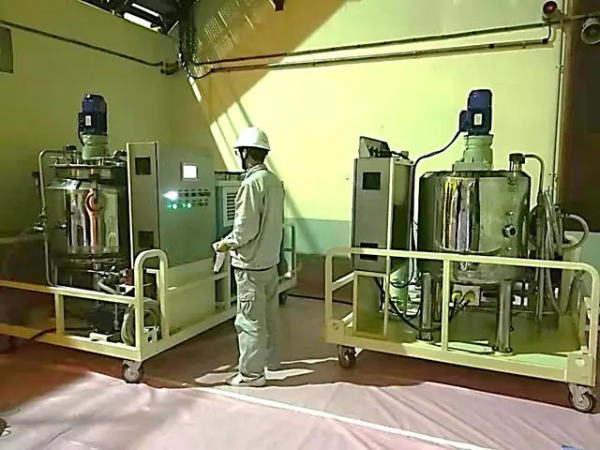In a recent development, CIRP together with Daya Bay NPP have made advancements in the management of radioactive organic waste oil at the nuclear power plant. The processed radioactive waste oil has been approved by the National Nuclear Safety Administration, meeting the requirements for clearance. The comprehensive disposal chain established by the team, from treatment to the final clearance of radioactive waste oil, has filled a gap in industrializing the treatment of radioactive waste oil in China, marking a milestone in the safe disposal of radioactive waste oil.

Addressing challenges related to the flammability, chemical toxicity, and corrosiveness of radioactive waste oil, as well as issues related to scattered storage and the lack of effective domestic treatment methods, CIRP initiated research and a series of feasibility experiments in 2017. Through processes involving oxidation aging, circulation filtration, multi-stage filtration using radioactive waste bolt cleaning agents, and cyclic ion exchange combinations, the team achieved decontamination factors for 137Cs and 60Co reaching two orders of magnitude. These results meet the clearance requirements for both radioactive and hazardous waste while effectively addressing vapor generation as well as oil and gas spillage during the oxidation aging process.
Over the years, the team has focused on the industrial application of the technology. Building upon the existing treatment techniques, they have iteratively upgraded equipment to make it modular, mobile, and cost-effective. This approach has resulted in the development of compact, simple, safe, and reliable experimental equipment, forming a method of handling radioactive waste oil specific to China. As this technology is applied more widely at nuclear power sites, it is expected to contribute significantly to solving the problem of safe disposal of radioactive waste oil, enhancing the management of radioactive waste, eliminating safety hazards, and ensuring the secure operation of nuclear power plants.
Background: Currently, various methods for handling radioactive organic waste liquid have been developed globally, including incineration, adsorption-solidification, emulsification-solidification, microbial degradation, oil-water extraction, chloride precipitation, and oxidation aging. Among these, incineration is highly efficient but requires significant investment in equipment and faces challenges related to the transportation of radioactive waste oil. Adsorption-solidification is simple and efficient but relies on imported adsorbents, making it costly. Emulsification-solidification is cost-effective but increases the volume of waste oil significantly. Microbial degradation reduces waste volume substantially but has limitations in terms of usage and processing time. Oil-water extraction is cost-effective and straightforward but takes a long time and has limited effectiveness. Chloride precipitation reduces waste volume and has good processing results but involves complex procedures and higher costs. Oxidation aging has a significant reduction ratio, simple process, and good results, achieving radioactive waste oil concentrations that meet clearance standards.
Contact: official@cirp.org.cn



 打印
打印



